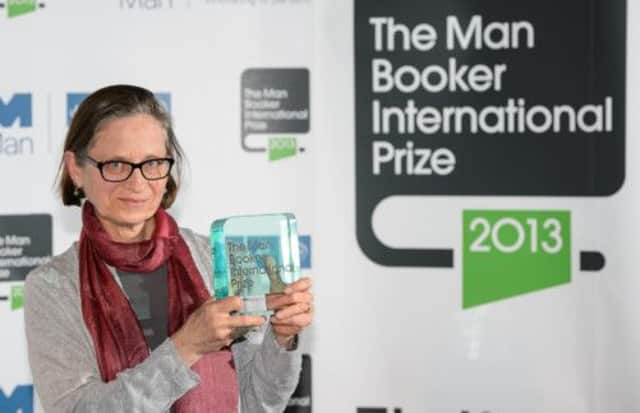Lydia Davis fulfils Booker Prize brief


On Wednesday, at the Victoria and Albert Museum in London, her disconcerting mental longevity, her curious traction on any reader’s brain was fully recognised when she became the fifth winner of the International Man Booker Prize.
She follows Ismail Kadare, the late Chinua Achebe, Alice Munro and Philip Roth as winner of the £60,000 prize, and some commentators have been concerned that she is the third North American writer in a row to win it and the fourth English language writer, suggesting that the prize’s remit – “it highlights one writer’s overall contribution to fiction on the world stage” – was not wholly fulfilled. That might even be true had the winner been anyone other than Lydia Davis.
Advertisement
Hide AdTim Parks, one of this year’s judges alongside Elif Batuman, Yiyun Li, Aminatta Forna and chair Professor Sir Christopher Ricks, has spoken about the impossibility of the judging process; the sense that it is akin to comparing different sizes of infinity. The judges came up with a strong and unexpected shortlist: UR Ananthamurthy, Aharon Appelfeld, Intizar Husain, Yan Lianke, Marie NDiaye, Josip Novakovich, Marilynne Robinson (the only other Anglophone writer), Vladimir Sorokin and Peter Stamm.
Compared with previous years, they paid far more attention to non-English language writing (in 2005 there were eight English language writers; in 2007, nine; in 2009, six; and in 2011 eight). Only Robinson had previously been shortlisted. That UK readers were introduced to eight writers in translation that they might otherwise have been unaware of seems to indicate that the prize is doing what it should.
One could quibble with some aspects of the list – isn’t quibbling what prizes are for? – and I doubt I am alone in wondering why Thomas Pynchon has never been recognised (for that matter, why hasn’t he been awarded the Nobel Prize yet?).
Setting aside the question of language, I am certain that the judges made the right decision for one overwhelming reason. Of the ten writers they considered, Davis is the most avant-garde. Her stories expand the possibility of fiction itself, broaden its horizons, challenge its preconceptions. She is – and these sometimes seem like virtues the literary world has shunned – experimental, complicated, daring. In Ezra Pound’s famous phrase, she makes it new.
Ricks captured that quality when, in announcing her as the winner, he said “just how to characterise them is to the point… Should we simply concur with the official title and dub them stories? Or perhaps miniatures? Anecdotes? Essays? Jokes? Parables? Fables? Texts, or in the Beckett idiom, textes? Aphorisms, or even apophthegms? Prayers, or perhaps wisdom literature? Or might we settle for observations?”
With all due respect to the professor, “settle” is what one never does with Lydia Davis. “Unsettling” is her trademark. Reading her collections – Break It Down (1986), Almost No Memory (1997), Samuel Johnson Is Indignant (2001) and Varieties Of Disturbance (2007) – is to be perpetually caught off guard. She switches between elegy and comedy, surrealism and the quotidian, perplexity and epiphany: reading one Davis story tells you nothing about what the next story might be like. As, primarily, a short story writer and an American, she is, of course, not eligible for the annual Man Booker Prize; but I am certain that she encapsulates exactly the qualities my fellow judges and I are looking for as we plough through this year’s 150-odd entries.
Advertisement
Hide AdDavis is also a translator, of Flaubert and Proust, and her concision might blind readers to her affinities with those authors. She has Flaubert’s furious precision, and she has Proust’s ability to make writing seem like thinking, in all its unspooling and hesitant flows. She also links the older generation of American writers to the emerging generation: it was McSweeney’s, the magazine founded by Dave Eggers, that championed Davis when she was otherwise an obscure pleasure to select devotees. In a way, she has gifted them a way to be postmodern without being self-indulgent: she is the “chiel amang ye takin’ notes”, with all the empathy and espionage that implies, rather than the blind man playing chess against himself in a door-less room that some supposedly postmodern writers have adopted as their aesthetic.
It was my privilege to chair an event with Davis at the Edinburgh International Book Festival when her Collected Stories came out. She was beautifully bemused at being lauded, and, although her reputation is as a fierce writer, she was generous and witty, engaged and engaging.
Advertisement
Hide AdHer work, in so many ways, is not about altering what literature is, but trying (and failing) and failing (and trying) to capture what being human is. I’m very aware that any judge of a literary prize can’t influence future judges, but in giving the International Man Booker to Davis, this year’s judges have at least shown the prize is committed to rewarding not just excellence but innovation.